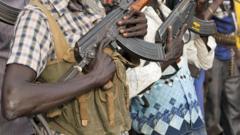In an alarming escalation of violence, the United Nations has raised concerns over the use of barrel bombs in airstrikes across South Sudan, highlighting the potential for a devastating return to civil war in the world’s newest country. The situation follows a surge of violence between government forces and the rebel militia known as the White Army in the northern town of Nasir, located in the strategically significant Upper Nile State.
Escalating Violence Threatens to Ignite Civil War in South Sudan

Escalating Violence Threatens to Ignite Civil War in South Sudan
The UN warns that South Sudan is on the brink of another civil war as barrel bombs wreak havoc on civilians amidst intensified conflicts.
UN mission head Nicholas Haysom reported that the White Army, which played a significant role in the civil conflict that began in 2013, has taken control of a military base, leading to extensive aerial bombardments that have caused numerous civilian casualties and serious injuries, particularly severe burns resulting from incendiary devices. Haysom cautioned, “A conflict would erase all the hard-won gains made since the 2018 peace deal was signed,” warning that renewed violence could have regional repercussions.
The government has not yet commented on the allegations of barrel bomb usage. In 2018, President Salva Kiir and Vice-President Riek Machar had reached a peace agreement to end a five-year civil war that resulted in nearly 400,000 deaths. However, tensions between the two leaders have escalated over the years, compounded by ethnic violence and sporadic conflicts. Incidents in March involving the arrest of senior allies of Machar raised alarms about potential violations of the peace agreement.
In recent statements, local leaders have described the situation as dire, with accusations of “chemical bombardments” from state forces. Eyewitness accounts indicate the use of dangerous substances like ethyl acetate, found at attack sites, which consumer reports confirm as incredibly flammable. While government officials assert the military operations target only the White Army, Haysom claims that the resultant civilian impact, particularly among women and children, has been substantial, with around 63,000 individuals displaced.
Moreover, misinformation and ethnic divisiveness exacerbate the conflict as South Sudan approaches expected elections in the coming year. Haysom stated that the UN mission, currently maintaining approximately 18,000 peacekeepers in South Sudan, is undertaking urgent diplomatic efforts to avert sliding back into all-out war.
Additionally, Vice-President Machar has accused Uganda of violating a UN arms embargo by conducting airstrikes in South Sudan’s territories, alleging that Ugandan forces are involved in attacks against civilians. Uganda confirmed sending troops to assist the Kiir government, a claim Juba has denied, further complicating the region's fragile situation.
The situation remains critical as South Sudan grapples with the potential march towards another devastating conflict, weighing heavily on its population and the broader regional stability.
The government has not yet commented on the allegations of barrel bomb usage. In 2018, President Salva Kiir and Vice-President Riek Machar had reached a peace agreement to end a five-year civil war that resulted in nearly 400,000 deaths. However, tensions between the two leaders have escalated over the years, compounded by ethnic violence and sporadic conflicts. Incidents in March involving the arrest of senior allies of Machar raised alarms about potential violations of the peace agreement.
In recent statements, local leaders have described the situation as dire, with accusations of “chemical bombardments” from state forces. Eyewitness accounts indicate the use of dangerous substances like ethyl acetate, found at attack sites, which consumer reports confirm as incredibly flammable. While government officials assert the military operations target only the White Army, Haysom claims that the resultant civilian impact, particularly among women and children, has been substantial, with around 63,000 individuals displaced.
Moreover, misinformation and ethnic divisiveness exacerbate the conflict as South Sudan approaches expected elections in the coming year. Haysom stated that the UN mission, currently maintaining approximately 18,000 peacekeepers in South Sudan, is undertaking urgent diplomatic efforts to avert sliding back into all-out war.
Additionally, Vice-President Machar has accused Uganda of violating a UN arms embargo by conducting airstrikes in South Sudan’s territories, alleging that Ugandan forces are involved in attacks against civilians. Uganda confirmed sending troops to assist the Kiir government, a claim Juba has denied, further complicating the region's fragile situation.
The situation remains critical as South Sudan grapples with the potential march towards another devastating conflict, weighing heavily on its population and the broader regional stability.






















